Let’s say you work with 4th graders and let’s say there are 30 students in your class (to make the math easy).
It’s the first day of school. How many of your 30 fourth-graders can already read at at least fifth-grade level? How many can already handle at least fifth-grade math? Could any of them keep up with middle schoolers in reading? With an average high school student? Just how far could your highest ability students go if we didn’t limit them with “grade-level expectations”?
A bunch of academics set out to get a handle on this: just how many students are performing above their grade level on day one of the school year?
Above Grade-Level in Language Arts
The authors found that:
20-40% of elementary and middle school students perform at least one grade level above their current grade in reading
Oof. We’re not talking one or two students in your 4th-grade class, but six to twelve of your thirty students!
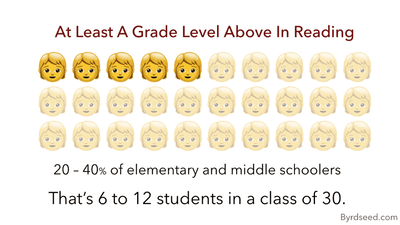
Above Grade-Level in Math
It’s harder for students to get ahead in math because we rarely give them the opportunities (it’s a lot easier to just give a kid a more advanced book than teach them next year’s math content, right?).
And yet, despite that:
11-30% [of elementary and middle school students perform] at least one grade level above in math.
That’s between 3 and 9 of the students in your 4th-grade class who are already capable of at least 5th-grade math.
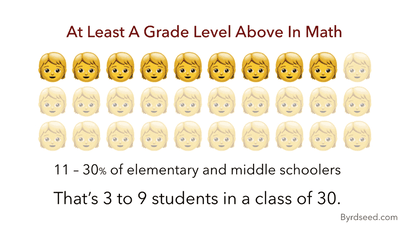
How about Four Grades Above in Reading?
If this many of your 4th graders are already ready for 5th-grade work, how many are ready for even more? The authors found that:
8-10% of Grade 4 students perform at the Grade 8 level in [language arts]
Let that sink in. 1 out of 10 4th graders could be reading at an 8th grade level. That’s 3 students in a class of 30 reading four grades above!
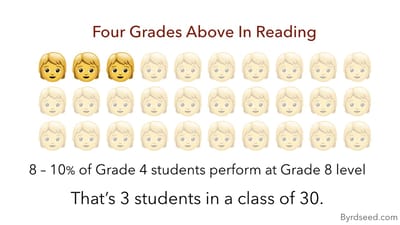
Four Grades Ahead In Math?
The authors found:
2-5% [of Grade 4 students] scoring at similar levels in math…
Again, take the caveat that kids rarely get to move as fast as they could in math and realize that, in a class of 30, you’ve still probably got a student who is already four years ahead.
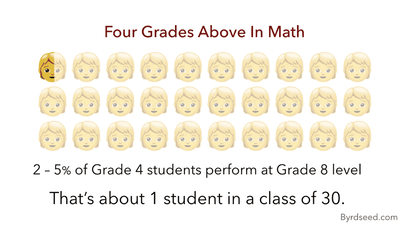
How Far Could They Go… If We Let Them?
So, we have to ask… just how far ahead are our top students? The authors counted up elementary students who can score above high school seniors:
…in 2013 alone, more than 400,000 Grade 4 students performed above the level of the lowest quarter of Grade 12 students in reading.
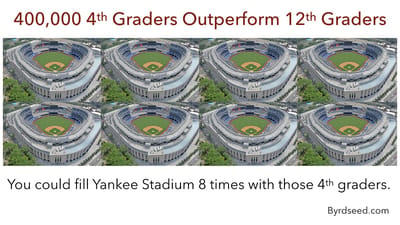
You could fill Yankee Stadium eight times with 4th graders who could perform better than the bottom quarter of 12th graders.
Grades Ain’t Nothing But A Number
It’s my greatest annoyance when folks say to me: “well, my 2nd graders can’t do that” or “that seems like a 5th-grade idea but I teach 4th grade”. I hear it in every workshop I lead – even when I’m speaking to teachers who work only with gifted students.
Hopefully these findings illustrate why that mindset drives me up a wall: grouping by grade level is an arbitrary choice. The fact that a kid is in 4th grade tells you basically nothing about their ability. Some 4th graders can do “4th-grade thinking” but some can do 5th, 8th, or even 12th-grade thinking.
We should never limit students because of the grade number they happen to have. It makes as much sense as holding a student back from a certain book until they hit a specific height!
Me, As A Student
Three personal stories to close out:
- As a first-grader, I was in a 1st through 3rd gifted combo. Sometimes I sat with the first graders. Sometimes I worked with the third graders. Sometimes I outperformed the third graders. Sometimes I learned from them. My teacher gave me what I was ready for. As a result, I could write in cursive and knew my multiplication facts in first grade. And I wasn’t the only one!
- When I was in 5th grade, I read the same books I read now as an adult. Literally the same books! (I just did a re-read of Jurassic Park) When my dad finished a book (and deemed it appropriate), he handed it down to me. I ate it up.
- My 6th-grade class performed Shakespeare’s Macbeth in front of our elementary school. No “kid-friendly language” either — the real deal. I still remember my first line: So foul and fair a day I have not seen!
So, do read the whole paper and, this year, see just how far you can push your students, regardless of their age!
